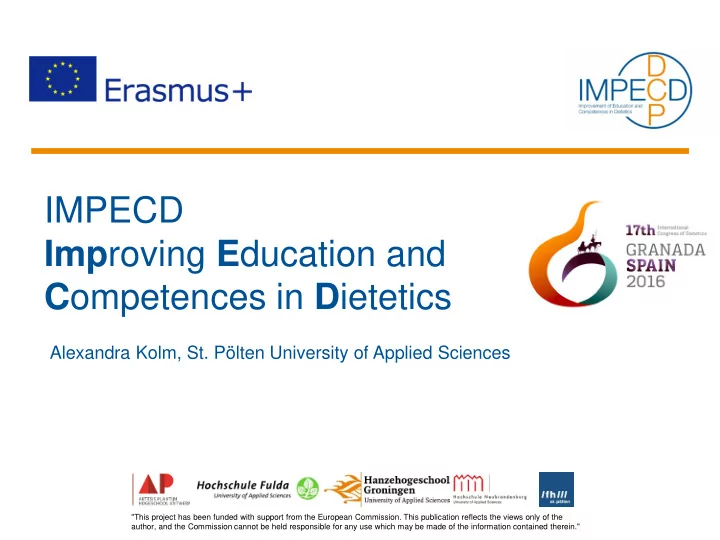

IMPECD Imp roving E ducation and C ompetences in D ietetics Alexandra Kolm, St. Pölten University of Applied Sciences "This project has been funded with support from the European Commission. This publication reflects the views only of the author, and the Commission cannot be held responsible for any use which may be made of the information contained therein."
Background Noncommunicable diseases (NCDs) take 38 million people’s lives each year worldwide (WHO, 2015). In Europe NCDs are the leading cause of morbidity and mortality . The World Health Organization (WHO) and the European Union (EU) have recognized the importance of nutrition in prevention and treatment of NCDs (WHO, 2014; EU, 2014). Dietitians play an important role in the prevention of NCDs and in patient care of several diseases (Lammers & Kok, 2012).
Health Professionals as Key Resource (Frenk et al., 2010)
Questions based on the Lancet Report How can education/training be more competence based? How can national and international networking be improved? How can the understanding and application of evidence-based dietetic be supported? How can applied research competence in dietetics be developed and supported? How can digital competence in dietetics be enforced? (Frenk et al., 2010)
Erasmus+ Strategic Partnership Consortium: 4 countries, 5 partners September 2015 to August 2018
WWW.IMPECD.EU
Partner EFAD European Federation of the Associations of Dietitians National Dietetic Associations from Austria, Germany, Belgium, and the Netherlands Experts for ICF: Claudia Bolheurs and Wineke Remijnse from the Netherlands
Our Goals 1. Development of a MOOC (Massive Open Online Course) until 2018, which can be used by dietetic students 2. Students learn based on a unified IMPECD Dietetic Care Process developed by the partner countries – necessary for collaboration 3. and ten Clinical Case Studies developed by students and peer reviewed by experts (Medical doctors, pharmacists etc.)
Selection of Clinical Case Topics Proportion of all deaths due to major causes in Europe, latest available year, among men (A). ( Nick Townsend et al., 2016)
Selection of Clinical Case topics 1. CVD 2. T1DM 3. T2DM 4. Stroke 5. Obesity/ Bariatric Surgery 6. Colon Cancer 7. Geriatrics 8. Coeliac Disease 9. Crohn‘s Disease 10. Liver Disease
Our Goals (2) 4. development of Pedagogical Learning Materials for the clinical cases and the DCP, 5. Development of Evaluative Tools and Testing Instruments – testing the materials & MOOC during two Intensive Study Programs (ISP) 6. Set up a Syllabus for Higher Educational Institutions to integrate the MOOC in their teaching if wanted 7. Publication of three Implementation Guidelines Nutritional Assessment 2016 Monitoring & Evaluation 2017 Dietetic Care Process 2018
Internships via Erasmus+ Marlene Lax and Nicole Van Hout University of Nijemegen, Netherlands - creating a clinical case on CVD during their 3 months internship in 2016
IMPECD Vision Focus on competences in dietetic training Support the development of national and international networks Understanding and application of evidence-based dietetics Development and progress of applied research competences Improve digital competences in dietetics
Project Team Team St. Pölten Team Antwerp Students Alexandra Kolm Koen Vanherle Petra Raffetseder Elisabeth Höld Hanna Aerts Nicole Van-Hout Daniela Wewerka-Kreimel Eline Baete Marlene Lax Gabriele Karner Bente Le Bruyn Alexandra Illy Marie-Luise Huber Veerle Van Vlaslaer Markus Seidl Christian Freisleben-Teutscher Team Neubrandenburg Stefanie Grössbacher Luzia Valentini Daniel Buchholz Team Groningen Shelly Rachman-Elbaum Andrea Werkman Renate Heine Team Fulda Maaike Roemeling- Walters Kathrin Kohlenberg-Müller Christina Gast Sigrid Hahn
References European Union. (2014). Regulation (EU) No 282/2014 of the European Parliament and of the Council of 11 March 2014 on the establishment of a third Programme for the Union's action in the field of health (2014-2020) and repealing Decision No 1350/2007/EC Retrieved 15 2 2015 from: http://eur- lex.europa.eu/legal- content/EN/TXT/PDF/?uri=CELEX:32014R0282&from=EN. Frenk, J. et al. (2010). Health professionals for a new century: transforming education to strengthen health systems in an interdependent world. The Lancet , Volume 376, Issue 9756, 1923 – 1958. Lammers, M., & Kok, L. (2012). Cost-benefit analysis of dietary treatment . SEO Report No. 2012-76A. Amsterdam: SEO ECONOMIC RESEARCH. Retrieved 28 1 2015 from: http://www.seo.nl/uploads/media/2012-76a_Cost- benefit_analysis_of_dietary_treatment.pdf Townsend, N., Wilson, L., Bhatnagar, P., Wickramasinghe, K., Rayner, M., Nichols, M. (2016). Cardiovascular disease in Europe: epidemiological update 2016. European Heart Journal , doi:10.1093/eurheartj/ehw334. World Health Organization Regional Office for Europe. (2014). European Food and Nutrition Action Plan 2015-2020 . Copenhagen: WHO. Retrieved 15 2 2015 from: http://www.euro.who.int/ data/assets/pdf_file/0008/253727/64wd14e_FoodNutAP_140426.pdf World Health Organization. (2015). Noncommunicable diseases . Retrieved 15 2 2015 from: http://www.who.int/mediacentre/factsheets/fs355/en/.
Recommend
More recommend